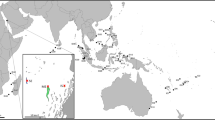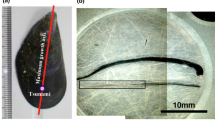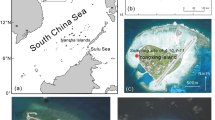Abstract
ALTHOUGH Wells1 and Scrutton2 suggested methods of studying fossils to determine probable changes in day length, few studies have followed these suggestions. We have examined fossil bivalve shells to try to determine whether the obvious growth lines on the shells are related to tidal or other environmental phenomena. Although the study is continuing, some of the results already obtained are significant.
This is a preview of subscription content, access via your institution
Access options
Subscribe to this journal
Receive 51 print issues and online access
$199.00 per year
only $3.90 per issue
Buy this article
- Purchase on Springer Link
- Instant access to full article PDF
Prices may be subject to local taxes which are calculated during checkout
Similar content being viewed by others
References
Wells, J. W., Nature, 197, 948 (1963).
Scrutton, C. T., Palaeontology, 7, 552 (1964).
Barker, R. M., Journal of Paleontology (in the press).
Munk, W. H., and MacDonald, G. L. F., The Rotation of the Earth, 250 (Cambridge Univ. Press, 1960).
Author information
Authors and Affiliations
Rights and permissions
About this article
Cite this article
BERRY, W., BARKER, R. Fossil Bivalve Shells indicate Longer Month and Year in Cretaceous than Present. Nature 217, 938–939 (1968). https://doi.org/10.1038/217938b0
Received:
Issue Date:
DOI: https://doi.org/10.1038/217938b0
This article is cited by
-
Secular Retardation of Earth’s and Mars’ Rotation: The Role of Velocity Dependent Inertial Induction
Proceedings of the National Academy of Sciences, India Section A: Physical Sciences (2019)
-
High diversity of the Ganzhou Oviraptorid Fauna increased by a new “cassowary-like” crested species
Scientific Reports (2017)
-
Experimental measurement of growth patterns on fossil corals: Secular variation in ancient Earth-Sun distances
Chinese Science Bulletin (2010)
-
Combined sclerochronologic and oxygen isotope analysis of gastropod shells (Gibbula cineraria, North Sea): life-history traits and utility as a high-resolution environmental archive for kelp forests
Marine Biology (2007)
-
The moon as the origin of the Earth's continents
The Moon and the Planets (1980)
Comments
By submitting a comment you agree to abide by our Terms and Community Guidelines. If you find something abusive or that does not comply with our terms or guidelines please flag it as inappropriate.



